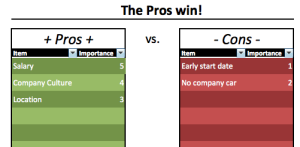There are 168 hours in the week. And an average workweek for a full-time employee is somewhere around 45 hours.
Keep that in mind as you consider the rest of the hours you spend during the week:
- 56 hours sleeping
- 35 hours eating, showering, commuting, etc.
- 45 hours working
- 32 hours doing what you enjoy
The striking takeaway is that you’ll work more (45 hours) each week than you’ll spend in your free time doing what you enjoy (32 hours).
The hours above were estimated and may vary, but the point holds true: You’re going to spend a lot of time at work, and more time than you will spend seeing your family, hanging with friends, or being entertained.
So unless you want to be miserable, it’s important you enjoy what you do.
But here’s the scary fact. Gallup did a study that found 70% of Americans are not happy at work. That’s 7 out of 10 people who are uninspired at their job!
What’s this mean for you? Well if you’re a young professional, chances are you want more out of your job. (And if you’re a college student, then the odds are you won’t be content at work after you graduate if you don’t know what to look for.)
So how can you be in the 30% group that’s happy with their job?
That’s what I’m going to share with you.
4 Steps To Find Work You Enjoy
You can be upset with your job and complain for years while doing nothing about it. Or you can take control of your life to find work that is satisfying. Based on science, research, and my experiences, when you follow these four steps you’ll discover a job you don’t mind waking up for on Monday morning.
1. Know what you want and don’t want
Before you start looking for new jobs, you need to know what kind of job you want. Explorers don’t set out on a mission without a map, and neither should you in your job hunt.
So consider some questions below to first learn about yourself:
- What type of work would excite you?
- What kind of company values or culture suits your personality?
- How much do you prioritize future career opportunities?
- How much personal autonomy do you need over your work and time to be happy?
- Where does liking your boss fit on your priority list?
Reflecting on these questions will help you in your future job search, so don’t blow it off.
And it’s equally as important to know what you don’t want so you’re not stuck in another position that makes you hopeless. Remembering what you specifically dislike at your current job will provide urgency to find a new job—again, after you know what you want.
2. Follow your curiosity with actions
What are you curious about or interested in? Knowing this answer is helpful because pairing a curiosity with a job leads to enjoyment.
A good starting point is gathering information about your curiosity. Read about it, talk to others, and think about whether you would enjoy this career. But these actions will only get you so far. The only way to validate that you’d enjoy a job is to take action and try it.
For example, I became interested in entrepreneurship as a pre-law English major in college. I read about it, thought about it, but didn’t know if it was something I could do for my career. So I decided to try it by starting a blog (super low-risk). I soon learned that I loved creating content and providing value to people.
Now I’m an author and internet-entrepreneur because I followed my curiosity with small actions over time. And not a day goes by where I don’t love my work, which is why I’m always working.
3. Make money a secondary priority
Money is important, don’t get me wrong. It’s needed to pay bills, provide for yourself, and possibly others. But if your needs are met, you have some money to spend on entertainment, and money to invest to grow your net worth, don’t overvalue a high salary.
A Glassdoor.com study found that a 10% increase in income correlated with a tiny 1% increase in happiness. And I’m sure many employees who chose a job primarily for the money find themselves in the group of 70% who are unhappy with their job. It’s ironic that many people who pick a job based on money actually grow to resent this fact when they’re sick of what they do.
However, when you free yourself to seek a job based on what you believe will make you happy and what you’re curious about, you give yourself the best likelihood to find a job that fits those two criteria.
And I’m positive the money will come if you explore your curiosity to the fullest in this new work because you’ll be self-motivated to work hard. Each new assignment will be exciting instead of mundane. And your energy will translate to better results, compared to other people who are going through the motions. I’ve found it’s the people most excited about work that provide the best value to their organization. Then they are compensated appropriately.
4. Pursue a challenge
The challenge and excitement of meaningful work is the secret to being happy. Research backs this up by claiming that people are the most happy when they’re faced with difficult but doable work. When you find this, the time working goes faster and it often doesn’t feel like work.
Also, progress is another key element of finding joy at work. Knowing that you’re a step closer to a goal because of your effort is satisfying. And when the work is something you care about, this feels even better.
You’ll glow when you realize that you made a difference in contributing to work that mattered to some organization or someone. Or if you want an extreme challenge, consider starting a business.
Final Words
Besides picking your spouse, choosing your career is probably the biggest decision of your life. Keep this in mind when working and looking for new work. But if you take time to know what you want and don’t want, follow your curiosity, make salary secondary, and pursue a challenge, you’ll find work that inspires you.
And if you’re already in a job and know it’s time to quit, I recommend waiting to pull the trigger until you have a specific plan. Applicants who interview while employed are more desirable than an unemployed applicant. (If you have an interview coming up, read this post on good interview answers.)
But once you know what you need to do for your happiness, don’t wait another second to quit your job and go for it.
Related: 5 Steps To Get Your Dream Job




As a sophomore who has decided to graduate early but also has no idea where I want to go this just helped motivate me to figure out what I REALLY enjoy! I always looked at money to be the biggest reason for a job but once my mom quit her job as a vice president to be a self-employed consultant I realized happiness is much more important!
That’s so helpful you have your mom’s experience to give you perspective and insight. I’m positive you’ll find what you love if you give the thought time and reflect. You got it!